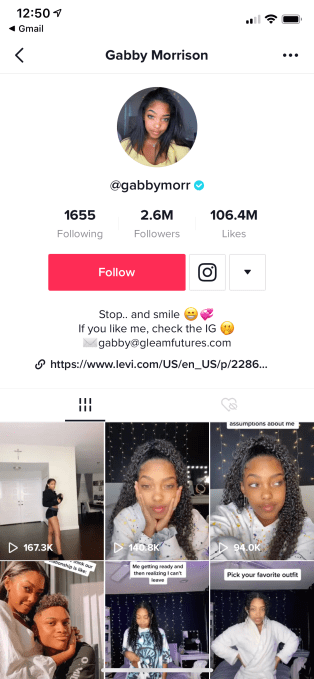Levi’s is leveraging its advertising partnership with TikTok to connect online shoppers with the denim brand amid the COVID-19 pandemic, which has forced retailers to close their doors — including most of Levi’s own stores. The company announced today its success as one of the first retailers to use TikTok’s “Shop Now” buttons that allow consumers make purchases through links posted to TikTok. Though the implementation is still in the early stages, Levi’s says it has already seen high engagement and increased traffic to its website, as a result of initial tests.
To send traffic to its e-commerce site, Levi’s recently partnered with TikTok influencers Callen Schaub, Cosette Rinab, Gabby Morrison and Everett Williams who used Levis’ laser-powered Future Finish 3-D denim customization technology to create their own customized denim. While the collaboration itself began before the shelter-in-place orders rolled out across the U.S., the resulting videos were only posted last week.
TikTok users viewing the influencers’ videos, which appeared on TikTok as in-feed ads, could then click to buy the same design on Levi.com up until the experiment wrapped on April 19.
Levi’s reports that watch time for these videos were twice as long as the TikTok platform average.
In addition, Levi’s notes that product views to Levi.com’s “Future Finish” pages more than doubled for every product included in the experience.
Though these are not hard numbers, few retailers have yet to share the results of their TikTok-powered social commerce efforts. In fact, the “Shop Now” call-to-action button itself is fairly new, so only a handful of advertisers have used the option to date.
TikTok is not the first social network the Levi’s brand has worked with — it also has similar partnerships with top social platforms like Snap, Instagram, and Pinterest. However, the company said it was drawn to TikTok due the size of its audience, noting that in November 2018 TikTok was then seeing 680 million monthly active users worldwide, and is now estimated to have as high as 800 million. Levi’s also noted that nearly 60% of that user base is in between the ages fo 16 to 24.
TikTok, meanwhile, has been dabbling in social commerce for over a year through a variety of efforts.
 For example, AdWeek in April 2019 reported on Hollister’s participation in a program that allowed retailers to run in-feed ads that directed customers to its e-commerce site by a “Shop Now” button. And Digiday last July noted Poshmark had done the same. In August 2019, Kroger became the first brand to try a new Hashtag Challenge Plus feature, which added a shoppable component to a TikTok hashtag.
For example, AdWeek in April 2019 reported on Hollister’s participation in a program that allowed retailers to run in-feed ads that directed customers to its e-commerce site by a “Shop Now” button. And Digiday last July noted Poshmark had done the same. In August 2019, Kroger became the first brand to try a new Hashtag Challenge Plus feature, which added a shoppable component to a TikTok hashtag.
Last November, TikTok also began to allow some TikTok users to add e-commerce links to their posts and their bios. Many of the beta participants testing this feature began linking from their video directly to Amazon, The WSJ had reported at the time.
In the case of the Levi’s influencer program, the videos from the creators ran as in-feed ads, linked to the retailer’s website. Some influencers also included a Levi’s website link in their bio, but this is separate from the advertiser-facing feature. (See photo on right).
“TikTok was the perfect platform for us to expand our efforts in social commerce. Over the last decade, we’ve been on a journey to not only grow our digital footprint, but also help our fans buy our products at the point of inspiration, when they see something they love,” said Brady Stewart, managing director, U.S. Direct to Consumer, in a statement about the TikTok partnership. “As consumer behavior shifts over the coming months and people explore different online channels for shopping and engaging with brands, we are here to connect with consumers, wherever they are,” he added.
The line between social media and commerce has been blurring for years, thanks to influencer-fueled advertising, in-feed ad units, shoppable media, and more. Instagram today event lets you shop from some retailers without leaving its app. Meanwhile, Facebook’s Marketplace has turned into an eBay and Craigslist-sized rival and its business Pages help customers and brands connect in a number of ways.
TikTok, however, has only dipped a toe in the water of social commerce as of yet. But given its app’s sizable reach, particularly among Gen Z, it’s an area to watch. And as the pandemic forces more retailers to remain closed to foot traffic in stores, being able to attract young shoppers to their online shops will be more valuable than ever.


 For example, AdWeek in April 2019 reported on
For example, AdWeek in April 2019 reported on 